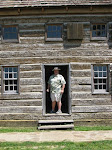
Roosevelt, of course, was the only American president to be elected for more than two terms. He had just started his fourth when he died. He was succeeded by Harry S. Truman who, contrary to political myth, was not an obscure former senator from Missouri, but a prominent former senator who'd been on the cover of TIME in 1943.
One can debate Roosevelt's policies, but he was, as Ed Murrow described him, the central pivot of 12 years of American history, leading the nation through the Depression and World War II. He is considered by most historians one of the great American presidents, often ranked third behind Lincoln and Washington. His policies did not end the Depression, but Roosevelt gave Americans a sense of hope and a sense that he cared, and that he understood the impact of the economic disaster on the ordinary American.
FDR invented the modern presidency, for better or worse. He was the first to use mass media, addressing the nation frequently by radio in his fireside chats. He was the first to fly to a political convention. And he became an internationalist in an age of isolationism. He was not a great intellect, nor was he impeccably honest (to put it mildly), but it is hard to think of American history without him. He had the sense to appoint Republicans to high positions to help fight World War II, symbolic acts that established, at least for a time, a bipartisan foreign- and defense policy. His bond with Winston Churchill during World War II was one of modern history's great partnerships.
The decision, in 1944, to replace the naive left-wing vice president, Henry Wallace, with Harry Truman on the Democratic ticket was an act of political genius, although the Congressional leadership probably had more to do with it than Roosevelt himself. And that act, based on Truman's actual performance in the Senate, demonstrated the enormous value of listening to people who actually know a candidate for high office. It was a far cry from today's "democratic" primary system, where people vote for candidates who may have little actual experience, and who have not been examined by those who understand the pressures of the presidency.
It's remarkable to think that in 1944 the Democratic Party had on its ticket Roosevelt and Truman, two men later seen as great presidents. Compare please to today.
 |
| The Little White House, Warms Springs State Historic Site, Georgia |
For more information on the Little White House and Warm Spring State Historic Site, go here and here. Readers who enjoyed the insight of William Katz can read his blog here.

No comments:
Post a Comment